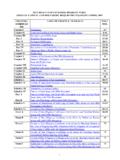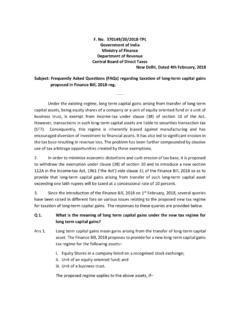Transcription of About ESOP Direct
1 About ESOP Direct ESOP Direct is a leading solutions company in the space of Equity based compensation. ESOP Direct is a part of the Kirtane Pandit group, in existence for more than five decades, consisting of an Accounting and Consulting firm, a Software services company and a Business Process Consulting company. As a group, we employ over 5000 professionals and operate globally through For More Information subsidiaries at US, UK, Germany, France and Poland and If you have any questions strategic alliances in over 100 countries. About the design, implementation, and ESOP Direct is a team of 50 professionals. Our expert team of maintenance of equity professionals brings experience in the preliminary analysis, compensation programs, planning, designing and implementation of ESOPs. Each of our please contact: consulting team members is a qualified Chartered Accountant/Company Secretary.
2 The team also consists of CPAs T: +91 20 6652 5284/85. and Management graduates including qualified CEPs (Certified Equity Professional) on board. CEP is a US qualification highly recognized in Equity based compensation space globally. ESOP Direct About our Services KP Corporate Solutions Our service offerings cover the entire life cycle of ESOPs Limited, including Plan conceptualization, Design, Documentation, Plan KPIT Cummins Campus management, Participant Services, Compliance and reporting. Plot 35-36, We are the first and the only company in India to offer a full Rajiv Gandhi Infotech Park spectrum of integrated on-line stock plan management services, MIDC Phase -1, Hinjewadi including plan administration, compliance, employee Pune, Maharashtra 411057. communication and online transaction capabilities. This service INDIA. is delivered using our proprietary platform My ESOPs.
3 At ESOP Direct we also offer a web based platform for financial reporting of stock options which includes valuation , expensing and reporting under IFRS, IGAAP & FAS 123R. About the write-up We hope that you find this white paper useful in understanding the relevant aspects of Stock Appreciation Rights being implemented by a Company. You should be aware that though we have endeavored to cover all relevant aspects and information in the white paper but it is not an assurance that it portrays an exhaustive summary or that it establishes legal veracity. With these factors in mind, it is important that you do not consider this to be a legal advice and do not rely solely on the information provided in this white paper. We would be pleased to help you review all pertinent information and can assist you in developing a comprehensive strategy to implement a Stock Appreciation Rights Scheme or any other share based employee benefits scheme for your employees.
4 1. Stock Appreciation Rights 1. Introduction Stock Appreciation Right (SAR) is one of the alternatives adopted for implementing an equity based compensation plan like Employee Stock Option Plan (ESOP), Employee Stock Purchase Plan (ESPP) or Restricted Stock Units (RSU). SARs can be further structured as either Equity settled SARs' or Cash settled SARs'. The Cash settled-SARs are known as Phantom Options. SARs as a concept contemplate passing-on of appreciation in the value of certain number of equity shares to the employees without requiring any payment from employee's side. It offers benefits to the company in terms of lower equity dilution and accounting cost as compared to other alternatives. SARs are recognized globally as one of the popular instruments of stock based compensation. Following the global trend, SARs are slowly gaining popularity in India as evidenced in SEBI's intention to regulate SARs under its recently enacted Securities and Exchange Board of India (Share Based Employee Benefits) Regulations, 2014 (SEBI SBEB Regulations).
5 In this context, it will be useful to explore SARs to evaluate if they offer any advantage from different perspectives namely, equity dilution, accounting and tax implications, employee and employer convenience, etc. This may help not only getting a closer insight into this less explored instrument in India, but also provide thoughts for rationalizing any existing scheme or bringing out a new scheme. 2. Concept As per SEBI SBEB Regulations, the term SAR conveys a right given to an employee entitling him to receive the appreciation of the market price of share of the Company on the date of vest or exercise of that right, as the case may be, over the SAR price/ base price. The appreciation is made either by way of cash payment or shares of the Company. The same concept is reflected The SARs essentially pass through the same life cycle as ESOPs/ RSUs. The stages of the SAR.
6 Implementation are (i) grant, (ii) vest, (iii) exercise, and (iv) sale of shares in case of Equity settled-SARs. The concept can be understood with an instance. Say, a Company grants 10,000 SARs today (Y0) to an employee with an equal annual vesting schedule over 4 years (Y1 to Y4) with an exercise period of 1 year given the following market prices over the period. The appreciation can be determined as under: S. No. Particulars Y0 Y1 Y2 Y3 Y4 Total Rs. 100. 1 Market price (Base price). 2 Less: Base price (SAR Price) Rs. 100 3 Annual vesting percentage 25% 25% 25% 25% 100%. 4 Appreciation per SAR (1-2) Rs. 50 5 Annual vesting of SARs (1000*25%) 2,500 2,500 2,500 2,500 10,000. 6 Cash for cash settlement (4 x 5) ,000 ,000 ,500 ,000 ,500. 7 Equity for Equity settlement (6 / 1) 833 1,250 1,590 1,785 5,458. 2. The mode of settlement is defined beforehand at the time of grant of SARs.
7 There might be any one of the following choices of settlement of appreciation: (i) Settlement only by way of equity shares;. (ii) Settlement either by way of equity shares or cash payment at the option of the Company;. (iii) Settlement either by way of equity shares or cash payment at the option of the Employee;. (iv) Settlement only by way of cash payment (where Company may deal with shares of the Company through Trust route); and (v) Settlement only by way of cash payment (without Company's dealing in shares directly or indirectly). Given the choices above, a Company may adopt one on evaluation of respective choices conforming to its requirements or constraints. 3. Comparative effectiveness A comparison vis- -vis other similar natured alternatives namely, ESOPs and RSUs, may reveal the effectiveness of SARs. Company specific desirable outcomes and constraints are considered while designing an equity based compensation scheme.
8 Some of the desirable outcomes may be in terms of minimum accounting cost, minimum outflow by the employees, taxability of employees, tax deductibility cost incurred by the company, possibility of upward appreciation in the hands of employees, convenient administration, etc. whereas constraints may be in terms of maximum equity shareholding that can be diluted by Promoters/ existing Shareholders, cash expense depending on cash flow projections, etc. Alternatives/ Equity settled - Cash settled - ESOPs RSUs Parameters SARs SARs Vesting period Vesting over the period Vesting conditions Time based / Performance based Performance measure Individual / Corporate High outflow of Minimal outflow Outflow by employee market price as on No outflow* No outflow of face value date of grant Tax liability on the Perquisite tax on Perquisite tax on Perquisite tax Perquisite tax employee exercise exercise on exercise on cash receipt Employee ownership Achieved Achieved Achieved Not achieved Upward appreciation Possible Possible Possible Not possible Equity dilution High Moderately low Moderately low No dilution Accounting cost /Cash High accounting No accounting No Accounting cost Cash payout payout cost cost Tax deductibility of Cash cost is tax Not applicable Uncertain# Not applicable accounting cost
9 Deductible * Though in principle nothing is payable by the employee in Equity settled-SAR, but as a legal requirement (under Section 53 of the Companies Act, 2013), the employee has to pay at least the face value. However, even this minimum outflow by the employee may be avoided with an appropriate Trust route structure. # Company may claim the accounting cost as per decision of Special Bench of Income Tax Appellate Tribunal, Bangalore, which may not be accepted by the Tax Authorities in the absence of any law in the Income Tax Act, 1961 or in a precedent by Supreme Court. As can be seen from the table above, SARs do have an edge vis- -vis other instruments on several parameters. 3. Apart from proponents for an Equity settled-SAR Scheme, certain other overriding restrictions on further issue of equity (irrespective of financial health of the Company) may prompt to prefer Cash settled-SAR Scheme.
10 These are as under: a) Promoters want to share the growth in the economic value of equity, but not equity itself. b) The Company cannot offer conventional equity based alternatives, because of corporate restrictions, say, a Joint-Venture or Shareholding Agreement. c) The Company has exhausted its equity under one or more equity plans but still desires to incentivize on a equity based plan, perhaps without providing stock itself. d) The Company belongs to a group and wishes to use equity shares of a group Company which is restricted under law - Cash settled-SARs benchmarked with equity of that group Company may work in such cases. e) When a larger chunk of lower Management personnel are intended to be covered as they prefer cash over equity. 4. Legal provisions Neither the erstwhile Companies Act, 1956 nor SEBI (Employee Stock Option Scheme and Employee Stock Purchase Scheme) Guidelines, 1999 (SEBI ESOP Guidelines) which ruled up to recent past, mentioned anything About SAR schemes.






